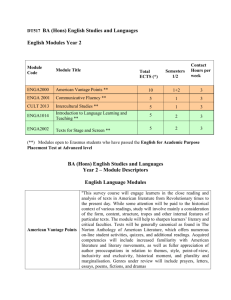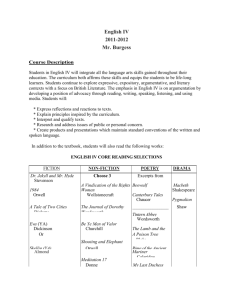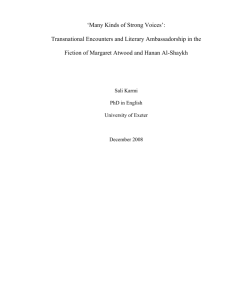Proposal
advertisement
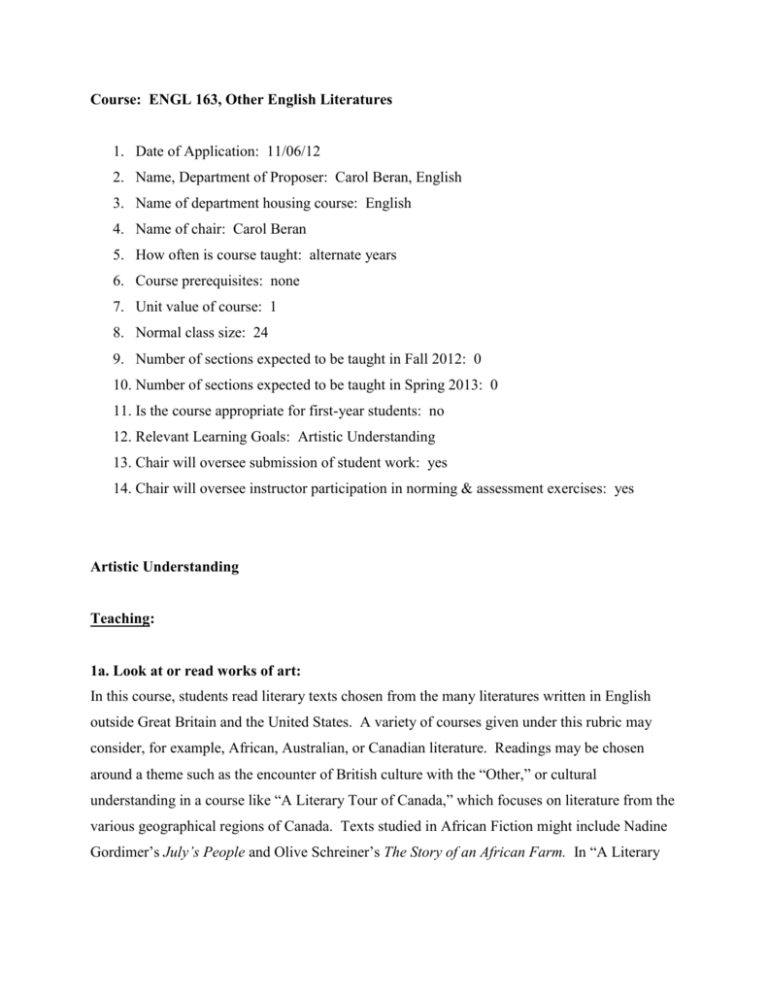
Course: ENGL 163, Other English Literatures 1. Date of Application: 11/06/12 2. Name, Department of Proposer: Carol Beran, English 3. Name of department housing course: English 4. Name of chair: Carol Beran 5. How often is course taught: alternate years 6. Course prerequisites: none 7. Unit value of course: 1 8. Normal class size: 24 9. Number of sections expected to be taught in Fall 2012: 0 10. Number of sections expected to be taught in Spring 2013: 0 11. Is the course appropriate for first-year students: no 12. Relevant Learning Goals: Artistic Understanding 13. Chair will oversee submission of student work: yes 14. Chair will oversee instructor participation in norming & assessment exercises: yes Artistic Understanding Teaching: 1a. Look at or read works of art: In this course, students read literary texts chosen from the many literatures written in English outside Great Britain and the United States. A variety of courses given under this rubric may consider, for example, African, Australian, or Canadian literature. Readings may be chosen around a theme such as the encounter of British culture with the “Other,” or cultural understanding in a course like “A Literary Tour of Canada,” which focuses on literature from the various geographical regions of Canada. Texts studied in African Fiction might include Nadine Gordimer’s July’s People and Olive Schreiner’s The Story of an African Farm. In “A Literary Tour of Canada” readings might include works by Margaret Atwood and Alice Munro set in Ontario, by Margaret Laurence set in Manitoba, and by Robert Kroetsch set in Alberta. 1b. Analyze/interpret form and meaning: The course analyzes texts with attention to their formal features, such as point of view, plot, character, and imagery. With every text studied, the mode of telling is linked to the story told. Students examine the effects of the length of a story on its development of plot and character, and how realism and the connection of the story to actual events affect readers’ responses. Thematic courses might focus on how different writers use various genre to explore a particular theme; historically based courses might look at how an era is expressed in literature; nationally based courses might consider how the literature explores the imagined nation. 1c. Apply discipline-based vocabulary: In order to examine the literary features of texts with any precision, students must employ a discipline-based vocabulary. For example, they must be able to distinguish between first- and third-person point of view, omniscient narrators and third person limited narrators, and among literary genres such as the novel, novella, the tall tale, short story, and the composite novel (linked short stories), and also in some versions of the course, various forms of poetry and drama. They must be able to identify elements of prose narratives, and to discuss writers’ use of such elements as irony, figurative language, and imagery. 1d. Explore the artistic piece’s significance within appropriate contexts: The large context within which texts are studied in this course may vary with the focus of the course. For example, “A Literary Tour of Canada” focuses on how a nation is imagined by its artists. African Fiction might set the literature in the context of a “Globalization” process, examining social, cultural, economic, and psychological implications of that process as influencing and influenced by literature. 2a, b, c, d. Participation in the creative process: not relevant for this course. Learning: how coursework will be used to measure student learning of the outcomes: 1a. Look at or read works of art: The course is conducted as a discussion, and limited to 24 students for that purpose. During each class meeting, students are expected to demonstrate in discussion that they have read carefully, noting relevant details of the text under study. In addition, in some versions of the course, students are expected to submit daily or weekly informal writing assignments (response papers, blogs, journal exercises, and/or in-class writing) that comment on specific features of the texts under study. For example, they may be asked to select a passage and comment on its role in the larger text; or they may be asked to note markers of social class in the day’s reading. 1b. Analyze and interpret form and meaning: Considerations of form and meaning together are essential to literary analysis. English 163 requires a minimum of three formal essays, in which students analyze meaning as it is conveyed through form, content, and context. For example, students might analyze how the three women’s lives that Margaret Atwood depicts in The Robber Bride might be seen as representative of certain types of contemporary Canadian women living in Toronto; they might be contrasted with heroines from works from other parts of Canada. Achebe’s protagonist’s life in Things Fall Apart might be seen to reflect his nation’s problems. 1c. Apply discipline based vocabulary: This is assessed in informal writing, three or more formal essays, and a final exam. 1d. Explore the artistic piece’s significance within appropriate contexts: The final exam will require students to demonstrate an understanding of the context within the specific context established for the course. For example, they might be asked to compare and contrast texts as post-colonial fictions or to compare and contrast fictional images of Canada with those presented in other texts such as tourist literature or materials representing the Chamber of Commerce of a particular city. 2a, b, c, d: Participation in the creative process: Not relevant to this course, although some essay assignments may include writing creative pieces in imitation of those on the reading list, and then analyzing how they imitate the original.



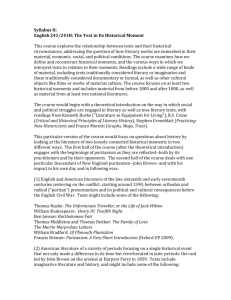

![Literature Option [doc] - Department of French and Italian](http://s3.studylib.net/store/data/006916848_1-f8194c2266edb737cddebfb8fa0250f1-300x300.png)
